Who we are
CBM Australia is a Christian international development organisation committed to empowering people with disabilities in the poorest communities around the world. CBM Australia is a member of the CBM Global Disability Inclusion Federation.
Thanks to our supporters, our programs can reach those who, because of disability, prejudice and social stigma, are the hardest to reach.
Our vision
We are driven by our vision for an inclusive world in which all people with disabilities enjoy their human rights and achieve their full potential.
Our mission
We are committed to our mission of fighting to end the cycle of poverty and disability.
We aim to be an authentic and effective ally for people with disabilities in all we do.
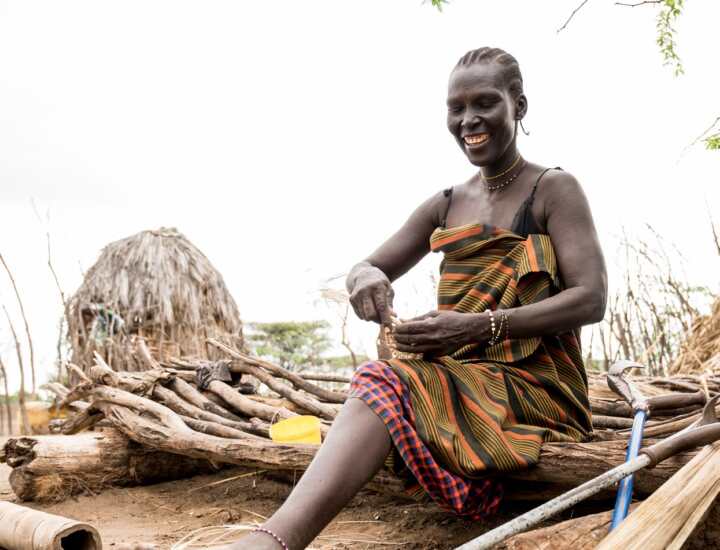
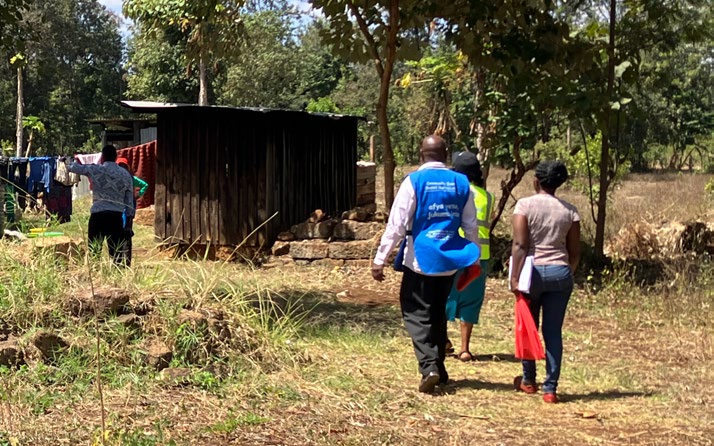
How we work
We work alongside people with disabilities living in the world’s poorest places, to fight poverty and exclusion and transform lives.
Combining our three ‘vehicles of change’ – Programs, Advocacy and Advisory – enables us to achieve much greater inclusion through engagement with communities and via service systems, local and national governments. We also advocate alongside the Disability Movement for crucial systems change at all levels and draw on our technical expertise to advise others how to make disability inclusion a reality within their own organisations and programs.
Drawing on more than 115 years’ experience and driven by Christian values, we work with the most marginalised communities to:
- Break the cycle of poverty and disability.
- Treat and prevent conditions that lead to disability.
- Build inclusive communities where everyone can enjoy their human rights and achieve their full potential.
Why we exist
We do this because one in six of us have disabilities, which is more than a billion people around the world – 80 per cent of whom live in low- and middle-income countries. In fact, 20 per cent of the poorest people living in these countries have disabilities.
After many decades of consistent global poverty reduction, several significant crises resulted in lost progress between 2020 and 2022. Low-income countries, which saw poverty increase during this period, have not yet recovered.
It is truly catastrophic.

1 b+

80%

20%
We also advocate alongside the Disability Movement for crucial systems change at all levels.
Messages from the Chair and CEO
Andrew Ellis Board Chair
Together we continue to achieve extraordinary things alongside people with disabilities and their representative organisations in the poorest communities across the globe.
We are truly blessed to be part of a global movement that is harnessing our amazing gifts (dollars and talents) in a variety of different ways that amplify our diversity of lived experience.
As a Board, we regularly reflect on what God seeks from us in the present and where our strategic future focus should be. It is in our differences and our diversity that we have strength. No contributor to disability inclusion plays the same role or has the same impact. God uses whatever we can bring. We simply rely on God to use us and our resources to best effect.
“There are many ways in which God works in our lives, but it is the same God who does the work in and through all of us…” – 1 CORINTHIANS 12:6 5
Australia, our region, and the world continue to wrestle with great uncertainty, fuelled by climate, conflict, and broader health anxieties. It is our ability to live with uncertainty, while being diligently constructive with the things we can control, that makes all the difference. People with disabilities in the poorest communities need us to make that difference by being their undaunted allies.
On behalf of the Board, I offer gratitude to every person and every organisation, large and small, that has joined in some way with CBM Australia in 2023 to break barriers and create positive, meaningful, and sustainable, change. This Annual Report tells some of the story of this joined-up impact; enjoy!

Jane Edge Chief Executive Officer
As a Christian international development organisation driven by our shared values and dedication to our mission, we have continued to strive with resolution and hope to be a catalyst for concrete, long-lasting and positive change for people with disabilities and their communities.
In 2023, we launched our new Strategic Directions, the road map that will guide us towards making a greater impact in the lives of people with disabilities in low- and middle-income countries. It is an immense challenge; made even harder as poverty, war and disasters continue to rise, creating catastrophic challenges in the lives of the world’s most vulnerable people.
In the first year of the strategy, CBM Australia leveraged the actions and resources of generous donors, the Australian Government, foundations and partners, to transform the lives of more than 4.1 million people through our international programs and many more millions through our advisory work. In 2023, we again influenced a pool of advisory partners who bring a combined program spend in excess of $1 billion.
Advocacy has been a huge focus as we amplified the voices of people with disabilities in our region to influence Australia’s new International Development Policy, launched in 2023, and the new Disability, Equity and Rights Strategy, coming to fruition in 2024.
I am incredibly grateful for God’s presence in our work. I am thankful for a supportive Board, a passionate and capable team, and the many partners who make our work possible, including compassionate Australians and the Department of Foreign Affairs and Trade.
Ours truly is a movement of the heart. A movement that needs your continued prayers and support, so that CBM Australia together with our CBM Global Disability Inclusion Federation can continue to work towards lasting change.

Our work internationally

12

30

30+
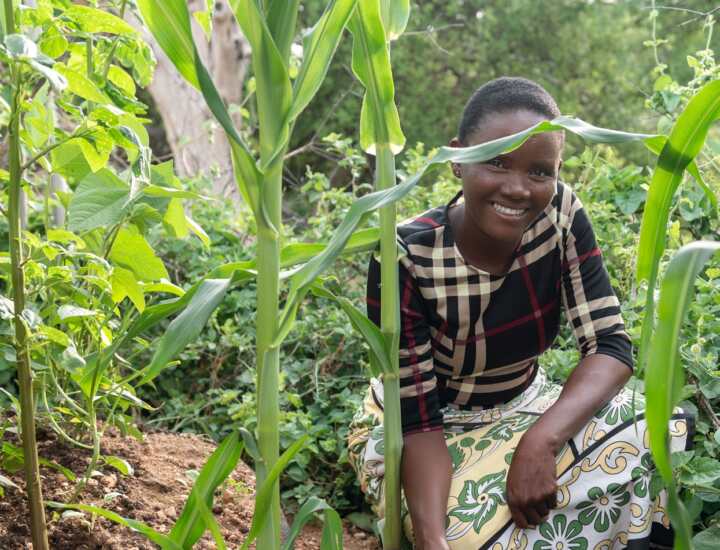
A key theme in our Strategic Directions 2023-2026 is Amplifying Impact. In 2023, we amplified our impact by expanding our reach and influence; implementing and integrating our three vehicles of change – Programs, Advisory and Advocacy – to work towards our vision of ending the cycle of poverty and disability.
In our programs we sought stronger local voice and agency through respectful and authentic partnerships, including with the Disability Movement, aligning our combined efforts for sustainable change. We implemented and learned how to better support people with disabilities to consider the emerging impacts of climate change and how to improve livelihoods. And we worked with local partners to advise on inclusion strategies for local level disaster preparedness.
We documented climate change impacts on people with disabilities in the communities where we work, and shared their stories to help amplify their voices on the issues that impact them the most.
Our programs and disability inclusion advice span the development eco-system, from community to systems level, in inclusive health and wellbeing, inclusive eye health, community mental health, disaster risk management and sustainable livelihoods, and in the foundations for inclusion, for example, support services, assistive devices, and strengthening of the Disability Movement.
As DFAT’s disability inclusion technical partner, we have continued to advise the Australian Government on how Australia’s official development assistance can take stronger approaches to disability inclusion. We had a strong focus in 2023 on DFAT’s programs in Vietnam, Indonesia, and Cambodia. We have also provided specific targeted support to the Australian NGO Co-operation Program, advising Australian non-government organisations on better approaches to disability inclusion in their programming across Asia, Africa and the Pacific.
We have supported other organisations with disability inclusion strategies and approaches, including
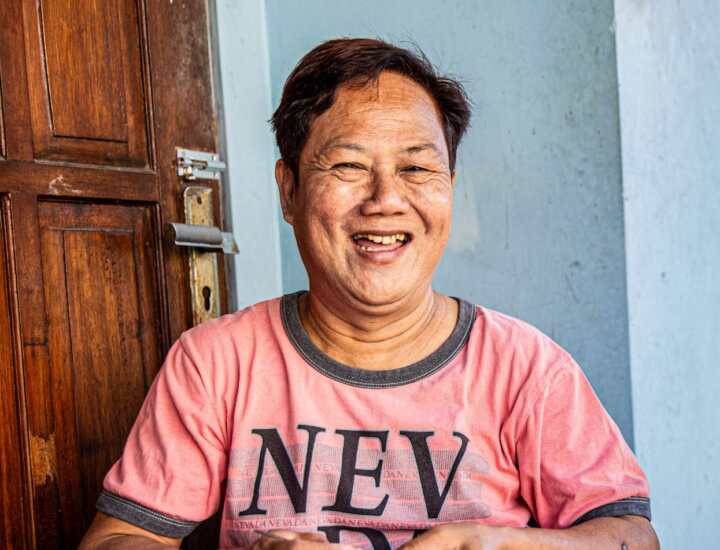
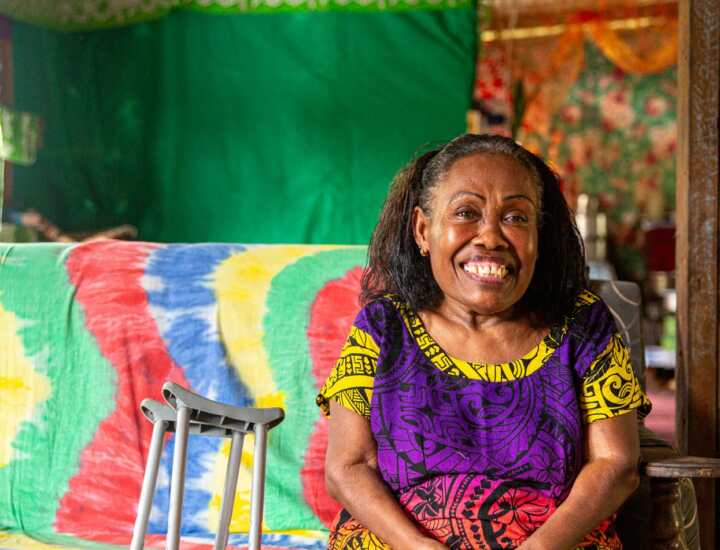
UN World Food Programme, UNICEF, Oxfam in Timor Leste, Fred Hollows Foundation, RedR and SNV Nepal.
We have continued to expand our work in the Pacific, across all three vehicles of change – Programs, Advisory and Advocacy – with a particular focus upon PNG, Fiji, Solomon Islands and Vanuatu. Through the roll-out of the CBM Global Pacific strategy, we’re strengthening our partnerships to create impact for the lives of people with disabilities across a wide range of programs including disaster preparedness, early identification of children with disabilities, rehabilitation, community mental health, inclusive eye health programs and strengthening the Disability Movement.
Our work in mental health has continued to expand, with a review of 20 years of our work in Aceh, Indonesia and models that are now being used in other parts of Indonesia.
We have done proactive work looking at the issue of gender-based violence across the communities in which we work and how our partners can improve approaches to address this.
Our impact
Building disability inclusion into refugee crisis response
The Rohingya crisis is the largest and most complex humanitarian crisis in the Indo-Pacific region, with more than 1.5 million people needing humanitarian assistance in Cox’s Bazar, Bangladesh.
The Australian Government’s Australian Humanitarian Partnership (AHP) Consortium brought together six Australian aid and development organisations, to support Australia’s wider efforts to assist the Rohingya crisis from 2020 to 2023. CBM Australia’s role was to support these organisations to better support refugees with disabilities.
CBM Australia, CBM Global and the Centre for Disability in Development (CDD), provided advice on how to improve access to services for people with disabilities across camps and surrounding villages.
We worked with organisations to:
Improve taps and wells, toilets, and bathing facilities
for people with disabilities in the community. This involved improving water supply, establishing bathing rooms, addressing menstrual hygiene needs, ensuring accessibility, and addressing specific challenges such as mosquito control.
Ensure people with disabilities had equal access to mainstream health care, rehabilitation and assistive devices
like walkers and wheelchairs. We also looked at how women and girls with disabilities could be better supported to access health care, particularly sexual and reproductive health care services.
Raise awareness and improve access to information
in areas where young people with disabilities are particularly vulnerable, such as child abuse, child marriage, sexual abuse, and trafficking.
Ensure children with disabilities had the opportunity to access and go to schools and learning centres
set up in the refugee camps; and demonstrate to teachers and parents how to support these children. Many children with disabilities who had been isolated in their families’ small huts were now able to play with other children.
Provide livelihood activities
such as farming, livestock and fish drying – to support people with disabilities to establish their own small business and become more independent and respected in the community. This helped to break down stigma and negative attitudes towards people with disabilities.
Help people with disabilities to attain disability identification cards
in order to access essential government services.
CBM Australia, CBM Global and the CDD provided advice on how to improve access to services for people with disabilities across camps and surrounding villages
This program reached more than 20,000 people with disabilities and significantly impacted a great many more communities.
We heard from people with disabilities themselves that the biggest changes included better accessibility, a shift in mindsets and attitudes, and more opportunities to be involved in life in the camp.
Our work in AHP Bangladesh increased attention to the daily challenges that people with disabilities face in accessing water, bathrooms, healthcare, education and livelihoods in camps and communities. However, there are still many people with disabilities who need to be reached, and many more barriers that need to be addressed. CBM continues to support disability inclusion under the next phase of the program.
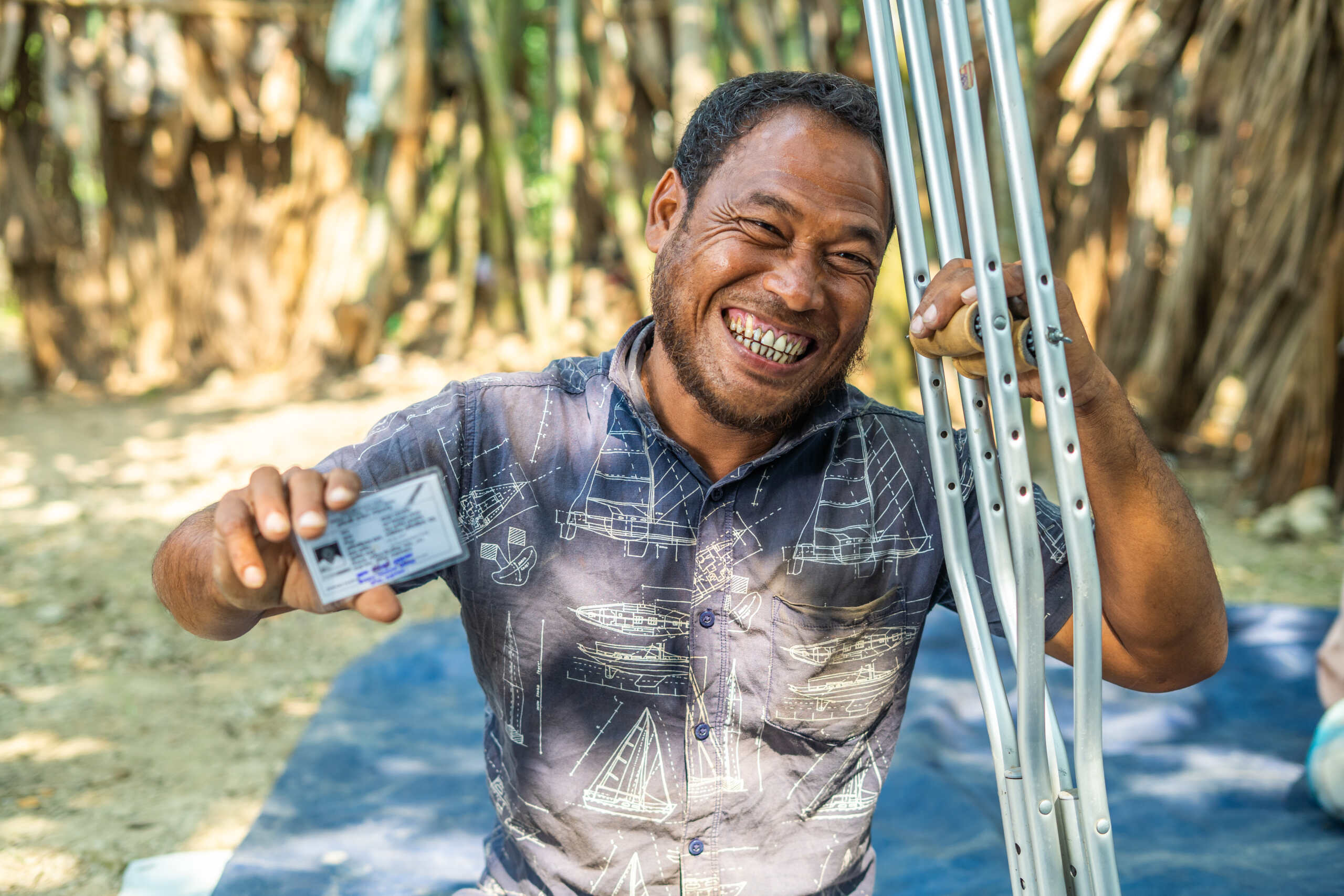
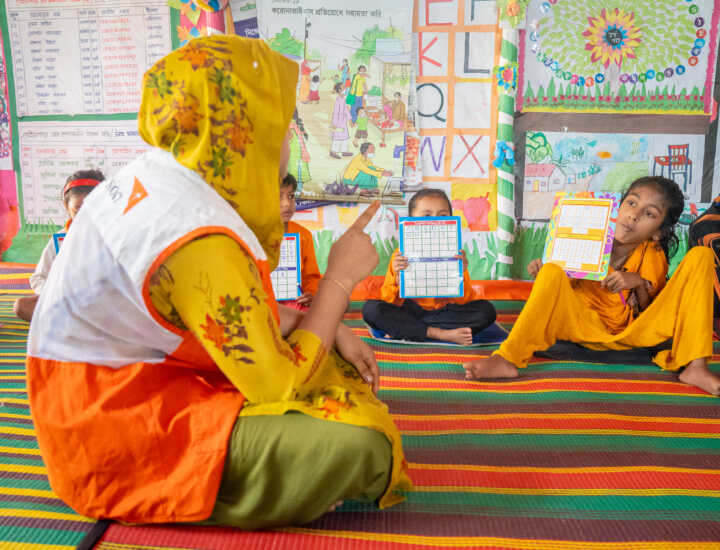
12-year-old Yasmina living with her family in Cox's Bazar
Yasmina is a 12-year-old girl with a physical disability living with her family in Cox’s Bazar, Bangladesh. Before the establishment of an Early Childhood Development Learning Centre in a community near the large refugee camps, there was limited opportunity for children to access learning centres. Yasmina’s mother shared the impact that the AHP Bangladesh Consortium has had for them, including sourcing a wheelchair for Yasmina, so her mother does not have to carry her to the centre, and a custom chair for her to use in the classroom. Teachers and facilitators have been trained to teach and include children with disabilities in the centre. Additionally, a community has been fostered with parents volunteering and supporting facilitators in the classroom. One mother reflected ‘all the children are my children. There is safety and security here. They are safe here. They learn here. They are all our children’. Yasmina’s mother reflected that Yasmina is happy here. She rushes her mum out the door to take her to the learning centre. One other parent reflected that the children like school more than they like their parents! That being said, parents reflected they needed this 10 years ago. It has been so important for everyone; the children, the parents, and the community.
Start with the basics,and change makers emerge
Addressing the fundamental needs of people with disabilities is the first step to wider change. This includes helping people to access health and rehabilitation support and improve their economic situation.
Our work in one community-based project in Meru, Kenya supported a rehabilitation workshop, which helped around 700 people – half of them children – to get customised assistive devices like prosthetics, adapted shoes, or access to other devices like walkers and wheelchairs. Assistive devices are the gateway to leading an independent life, and something that few people with disabilities in developing countries can access.
We know that helping people with disabilities to improve their economic situation through small savings groups
is a game changer.
‘People with disabilities clearly explained how they have been discriminated against and previously had limited opportunity to join savings groups. Establishing groups for people with disabilities has meant they do not need to rely on “well-wishers”, but they can save, and then can get a loan to pay for immediate or long-term needs,’ explains Jacqui Mutai, the program coordinator.
Some groups have generated significant group profits – from collective efforts to grow and sell coffee plant seedlings – or have applied for and received booster funds from both national and local governments.
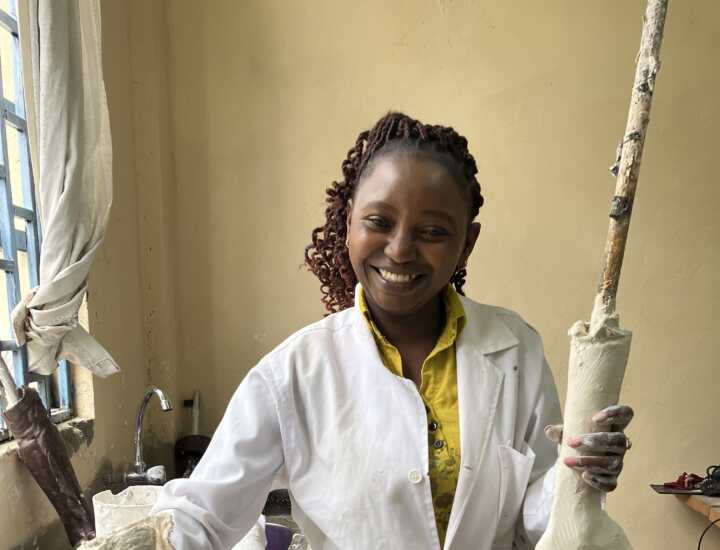
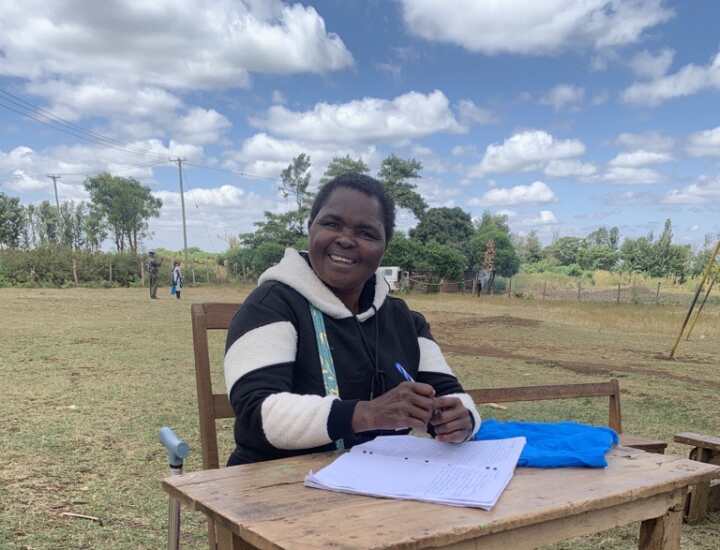
Leaders like Joanina Kajuju have emerged
Joanina got involved initially in a savings group and built up a small business in beaded jewellery. More than that, she has learned from other women with disabilities who are champions for change in their community, working with local government to improve people’s access to health care and social services.
In 2023, Joanina and Nancy (page 10) joined a team evaluating the project and helped gather insights around how local government has supported communities to improve sanitation and hygiene, and how people with disabilities are less stigmatised. When CBM’s project work in Meru is finished, a network of people with disabilities will remain who are confident to talk to government about justice issues, sexual violence, property rights and access to education.
Helping people take the next step
Iswadi lives in Aceh, Indonesia, and has a physical impairment. He supports six people including siblings with psychosocial disabilities, their children and his mother. Although Iswadi has been recognised in Aceh as a very successful runner and has won medals at the Disabled Games in Indonesia, the small kiosk he ran selling groceries and snacks hardly generated a consistent income to support everyone. He didn’t have enough cash flow to keep enough stock and often ran out of items people wanted to buy.
Part of CBM Australia’s project approach in all the countries where we work is to support people with disabilities to develop small businesses. With a small injection of support to buy more stock, and training in bookkeeping, Iswadi has now increased his sales and set up a bigger kiosk, which also provides space for people to buy coffee and chat together after work. With extra cash, he has bought and repaired an old motorbike, and now has funds for books and uniforms for his nieces to attend school.
Building skills and confidence is part of our approach. Iswadi is proud of his achievements; he is earning more money than he has before, is a member of an organisation of people with disabilities, and represents people with disabilities in local government meetings.
Recent evaluations of our projects in Nepal, Kenya, Indonesia and the Philippines have demonstrated that once people have an improved economic situation, as well as better access to health care, they can start working to change attitudes in their community.
In Aceh, many communities connected with CBM’s work have made the commitment to be a ‘disability inclusive village’. This means that village leadership sets an example by providing more support to people with disabilities, renovating community buildings to make them accessible, supporting transport to important events, supporting access to assistive devices like wheelchairs, and raising issues about mental illness. Our projects also link people with disabilities to existing government health services and supports, and strengthen local health systems to be responsive.
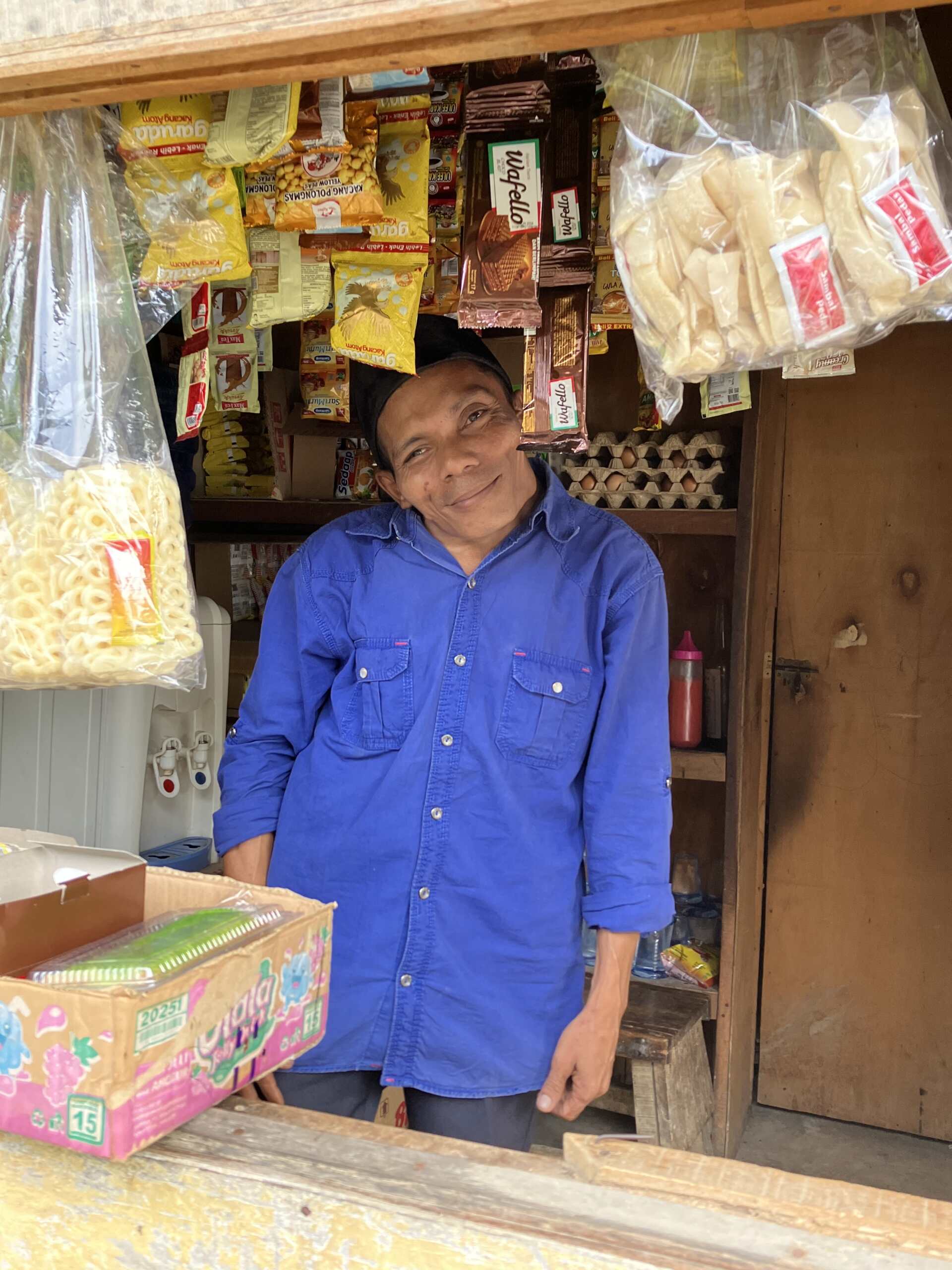
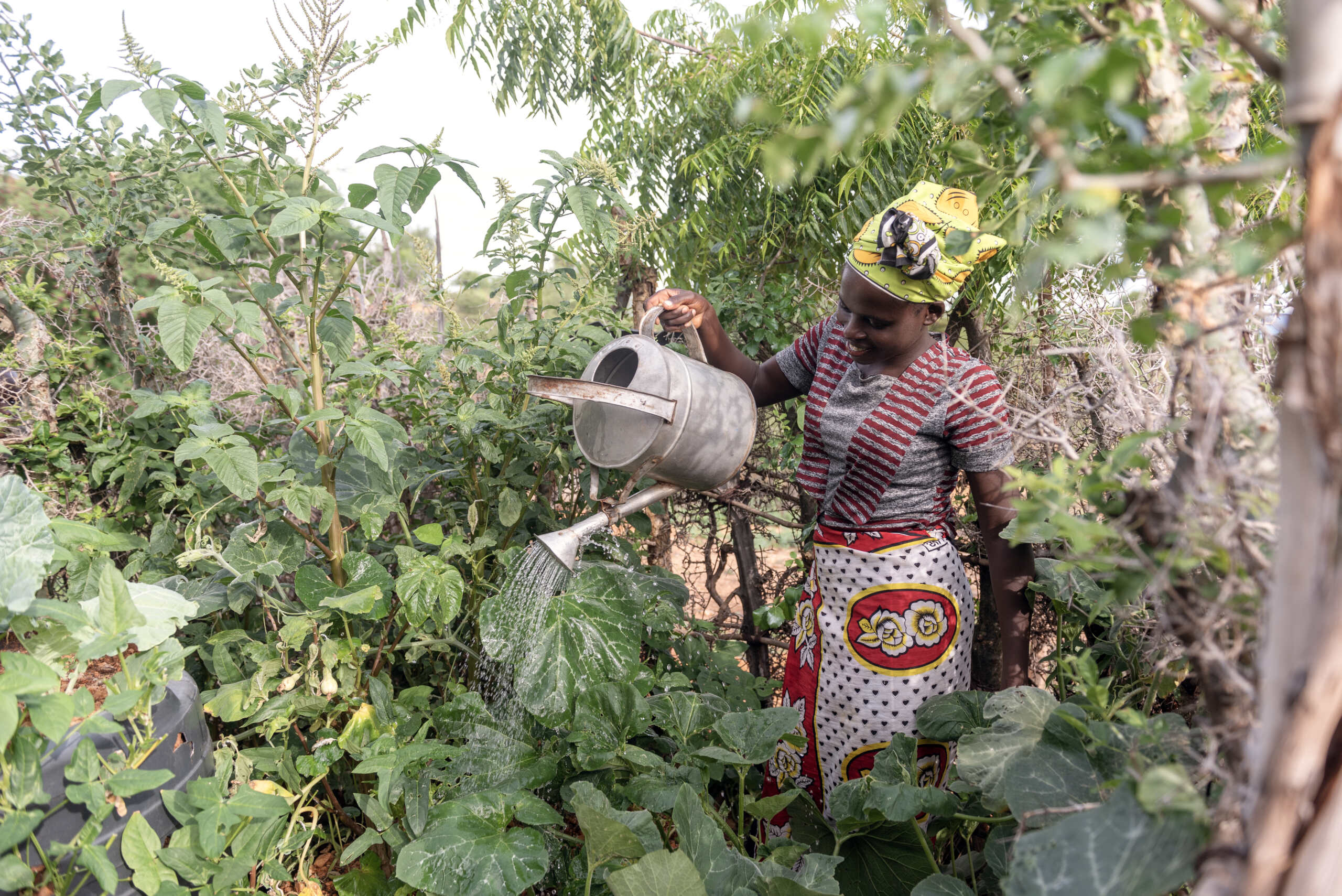
Because of you
Activating Connections is a key theme in our Strategic Directions 2023-2026. In its first year, CBM Australia was humbled by the outpouring of generosity, love and support from you, our generous Australian supporters. You enabled transformative programs to be delivered with and to people with disabilities and their communities in the poorest places.
Despite grappling with cost-of-living increases in Australia, you heard the call to help those most in need, those most impacted by the first global increase in extreme poverty in over a decade. This growth in poverty increased inequality and displacement and led to the rights and needs of people with disabilities going overlooked and unsupported. Importantly, you also funded our internationally recognised advisory work to help some of the world’s largest institutions become more disability inclusive. This ensured your contribution to ending the cycle of poverty and disability could be multiplied by influencing other organisations to support this vital mission.
Whether you have given to support our work in inclusive eye health – including cataracts – community mental health, humanitarian crises – including the famine in Kenya and Madagascar and disasters in Southeast Asia and the Pacific – or our work in education, employment and support programs, we thank you.
It is not just your financial support that creates our movement of the heart. It is the prayers you offer for CBM Australia’s work and the participants of that work. It is the volunteer hours that you put in at our Melbourne office or virtually. And it is signing up to support our advocacy to the Australian Government to ensure no one is left behind in humanitarian actions and international development.
With your help, CBM Australia ensured the Australian Government and the international development sector heard the voices and priorities of the most marginalised, which was vital in 2023 with the Government’s launch of the new International Development Policy and its consultations for the forthcoming International Disability Equity and Rights Strategy.
Because of your support, we were able to ensure the government highlighted disability equity as a key area of focus in the new policy and we are working hard to achieve a strategy that is ambitious, accountable and resourced, so that it can have significant, positive and sustainable impacts for people with disabilities across our region. Together with our CBM Global Federation, we also carried the voices and priorities of people with disabilities to important international forums and the United Nations.
Your support will remain vital in ensuring people with disabilities are not forgotten. Through your compassion, everyone can achieve or realise their rights and achieve their full potential.
New fellowship building inclusion capacity in the disability movement
An investment from an Australian philanthropist is funding a project to build disability inclusion capacity with the potential to benefit significant numbers of people with disabilities.
Our Inclusion Advisory Group (IAG) worked together with the International Disability Alliance (IDA) to deliver a new fellowship supporting six individuals from the disability movement in Asia. The fellowship is part of a larger project focused on building disability inclusion in the Asia Pacific region and is funded by CBM Australia’s philanthropic partner, Equity Trustees.
Over the two years of the project, IAG worked alongside peak Organisations of People with Disabilities (OPDs) on activities that complement and catalyse existing initiatives in the disability movement and strengthen the movement. Together we trained people with disabilities across Asia and the Pacific to advise and build others’ capacity to drive lasting systemic change in the region.
In the Asia component of the project, IAG together with IDA are training people with disabilities to provide localised advice on the issues that matter to them. This is complemented by additional capacity development activities with nine OPDs in the Pacific, co-delivered with our partner, the Pacific Disability Forum.
The six fellows all have extensive and diverse experience in the disability movement within their own country context. Over the one-year fellowship, they will be supported by both IAG and IDA to translate disability inclusion into practice.
The fellows will use their advisory skills and lived experience of disability to inform and agitate for change through providing advice to a minimum of 10 international governments, aid organisations, and major partners (such as UNICEF and the World Food Programme) who are urgently seeking this expertise.
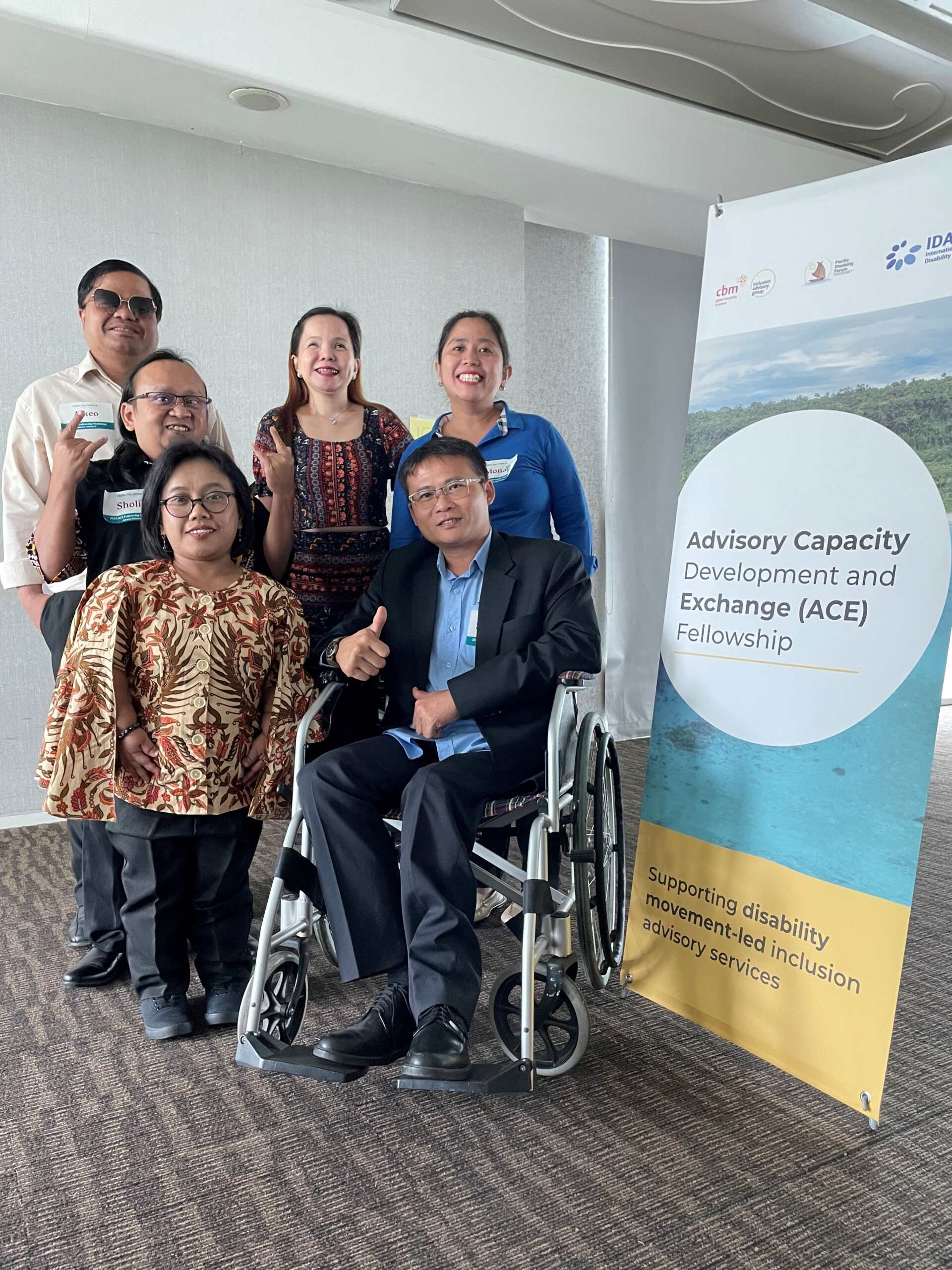
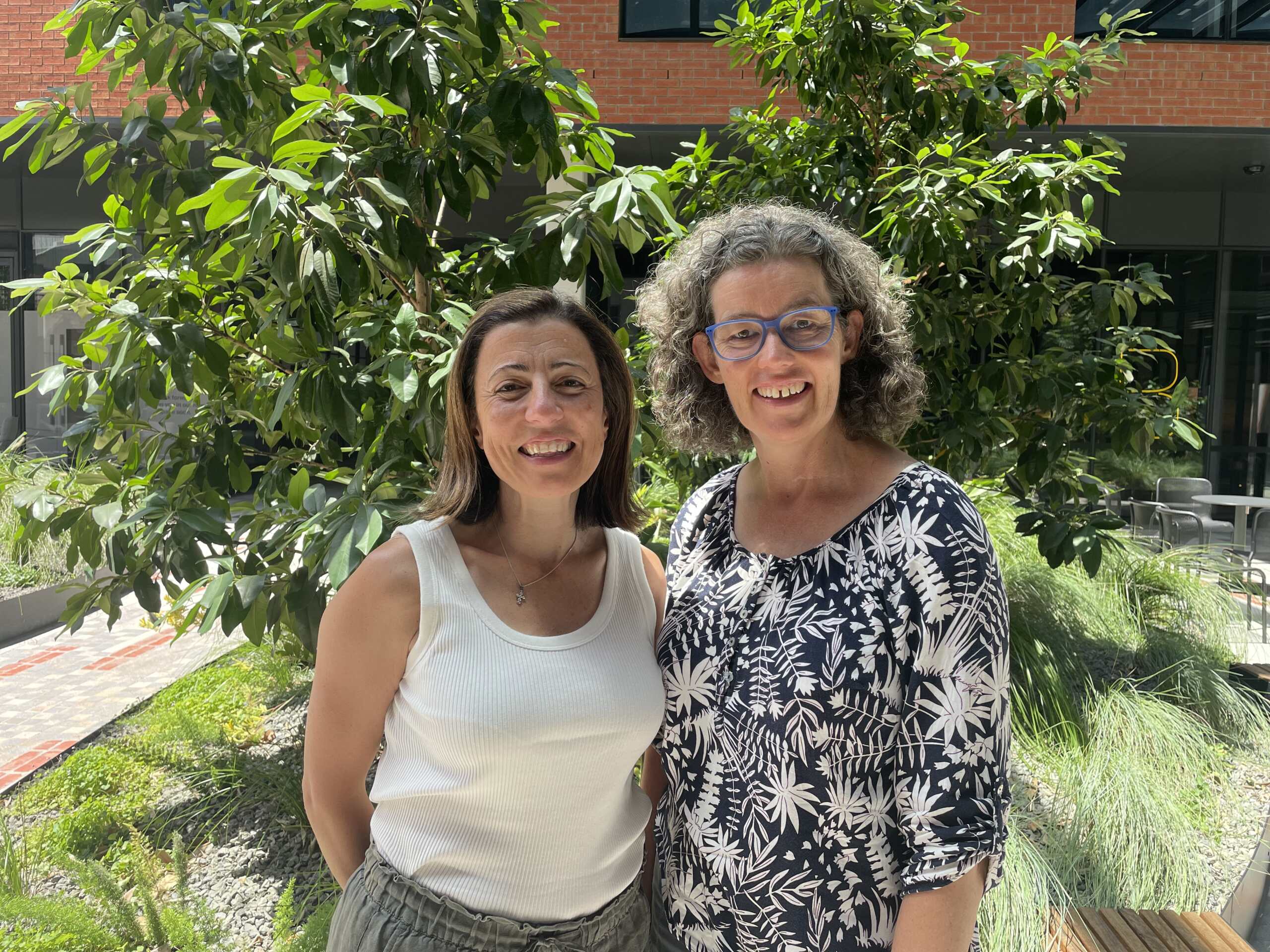
Vibrant volunteers
For Mary Romanous, volunteering at CBM Australia has been a perfect fit. She is delighted to be part of an organisation with such a rich history and ongoing growth.
Mary has worked in administration for most of her life and brings an array of skills and talents, especially in the way she faithfully serves with a dedication to not just the task set before her, but to the wider mission of CBM. ‘I am so impressed with CBM, the history, the reach of their partnerships and programs and the dedication of the team. I attended this year’s “Because of you” morning tea and Jane’s presentation was so moving. The more I learn about CBM, the more I want to be involved,’ Mary said.
Mary contributes a variety of administration activities, and in doing so, connects with various CBM Australia personnel and brings encouragement to all she meets. Mary also calls supporters to simply say ‘thank you’ for their generosity and support. ‘I love being in the space where there is so much dedication and commitment. There is definitely a mission here that is being fulfilled,’ she said.
Mary found CBM Australia by searching the Volunteering Victoria website, and from there did more research about CBM, and was inspired by what she found. Mary’s message to those who might be considering volunteering is: ‘Definitely give it a go. It adds a different dimension to your life’.
CBM Australia is looking forward to rebuilding its Volunteer Program in 2024-2026 after an intentional slow-down period during the COVID-19 pandemic and while we relocated our Melbourne office. As we move into our new premises in 2024, we are excited to welcome back our returning volunteers and to growing both our in-person and virtual volunteering communities.
Supporting the Disability Movement’s calls for equity
People with disabilities are one of the poorest and most marginalised groups worldwide. Australia has been a global leader on disability inclusion, however that leadership has waned over recent years, due to budget cuts and a lack of strategic implementation.
In a move welcomed by CBM Australia, in 2023 the Government renewed its commitment to people with disabilities in our region within the new International Development Policy and began development of a new strategy to deliver that commitment, the International Disability Equity and Rights Strategy.
Working closely with the Pacific Disability Forum (PDF), our advocacy has focused on amplifying the voices and priorities of disability leaders like Setareki Macanawai, CEO of PDF.
In December 2023, CBM Australia and PDF took our advocacy to Canberra; Seta and CBM Global’s Country Director in the Philippines, Hercules Paradiang, discussed priorities with government officials and provided invaluable contributions to a panel discussion hosted by CBM Australia at the influential Australasian Aid Conference.
Supporting the Disability Movement’s calls for equity discussed priorities with government officials and provided invaluable contributions to a panel discussion hosted by CBM Australia at the influential Australasian Aid Conference.
In partnership with disability leaders and allies, we are calling on the Australian Government to ensure the new International Disability Equity and Rights Strategy is ambitious, accountable and resourced, so that it can have significant impacts on the lives of people with disabilities in the Indo-Pacific region and beyond.
In November and December 2023, we amplified the voices and stories of people with disabilities around International Day of People with Disabilities, highlighting the barriers to inclusion people with disabilities face in all aspects of their lives.
For meaningful change to happen, we all need to work together to amplify and elevate the voices of people with disabilities. We hope you’ll join us as we continue to do this in partnership with the disability movement in 2024.
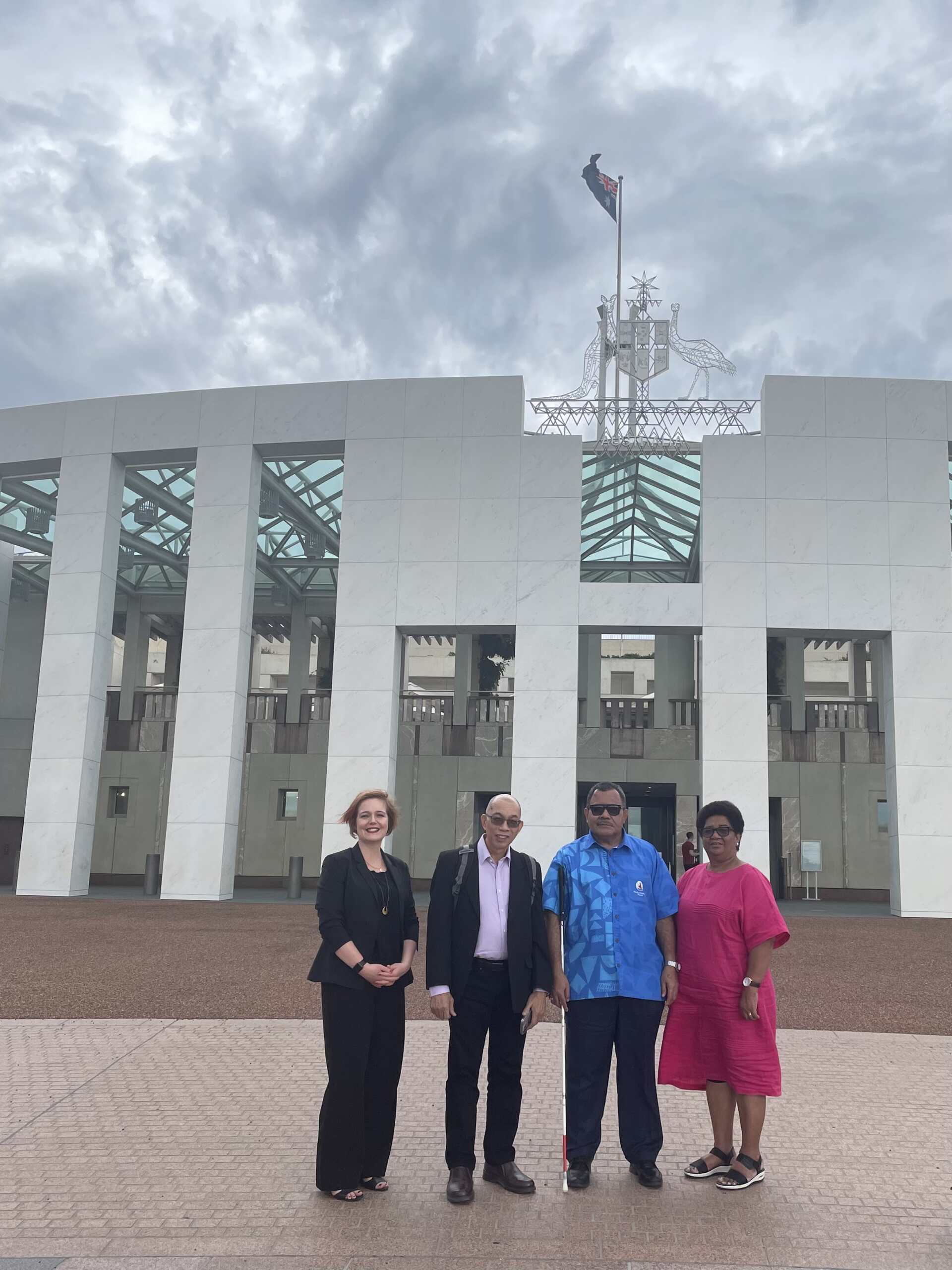
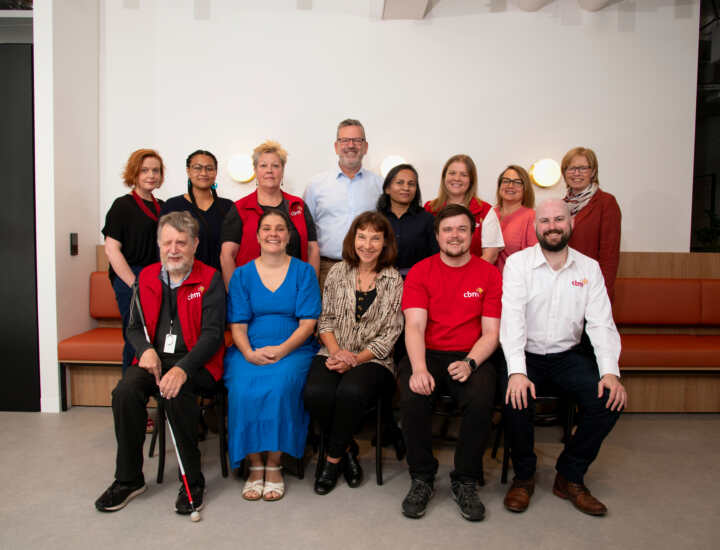
Our people, our culture
Strengthening CBM Australia’s team and foundations
In 2023, we continued our focus on uplifting our people, with a dedication to systems strengthening and strong stewardship. CBM Australia’s hybrid working model sees most staff in the office for two days a week. With our hybrid working rhythm established, our team has strengthened collaboration practices, enhancing organisational connectivity and engagement – which is a particular focus due to the COVID-19 pandemic. Throughout the year, our people demonstrated a continued passion to develop opportunities to connect across all business areas to further the CBM mission.
As the team excitedly awaits the finalisation of our new CBM Australia premises, we have continued to utilise our co-working space to enable this connection.
Across 2022, CBM Australia staff and management collaborated to develop a Disability Action Plan (DAP), which outlined CBM Australia’s approach to being a disability-inclusive organisation, demonstrating our commitment to be an excellent employer for people with disabilities. In 2023, we saw the implementation of many key DAP initiatives, such as our revised reasonable workplace accommodations process, enhancement of recruitment practices, and embedding of our Disability Employee Network (DEN) and our employee support group the Disability Inclusion Group (DIG).
As we continue to seek to attract the best people to deliver extraordinary impacts for people with disabilities in the poorest communities and with the challenges of the current market, we have focused on strengthening our attraction strategy. This helps ensure the CBM value proposition and cause is well communicated and our pathway to talent attraction is clear.
The strength of our partnerships and the generosity and compassion of our supporters continues to encourage our people to focus on our vision of ending the cycle of poverty and disability.
Our Disability Action Plan
Background
CBM Australia’s Disability Action Plan (DAP) 2023-2025 was developed as a framework to support us to build a disability inclusive culture. The four aspirational aims of the DAP are:
- Our organisational commitment to inclusion
- Our people
- Our work spaces and practices
- Our suppliers and partners
Progress in 2023
In 2023 we implemented a range of changes to make a positive difference for our staff with disabilities, and our organisation generally.
To build collective understanding, some staff with disabilities have written and shared their stories about the challenges they face at work.
As a result, we adjusted our practices to improve interaction and participation for staff with disabilities. This includes using accessible speaker introductions in meetings, captioning of video and live meeting discussions, and routinely disseminating meeting materials early to staff on request.
We also launched a formal approach to requesting additional support such as technology, equipment, or other requirements, to reduce barriers to workforce participation. In 2023 two staff used this process to enhance their ability to be effective in their roles. The same process is available to prospective employees in the pre-employment phases to support successful outcomes for people with disabilities.
We have successfully advocated for improvements to our present facilities to remove barriers for employees using wheelchairs. We have also finalised the design of our new premises (under construction), incorporating multiple features that enhance disability inclusion.
Disability inclusion is a shared commitment for us all.
Our values
We champion inclusion.
We pursue excellence.
We strive for justice.
We embrace partnerships.
We live with integrity.
At CBM Australia we live out our values.
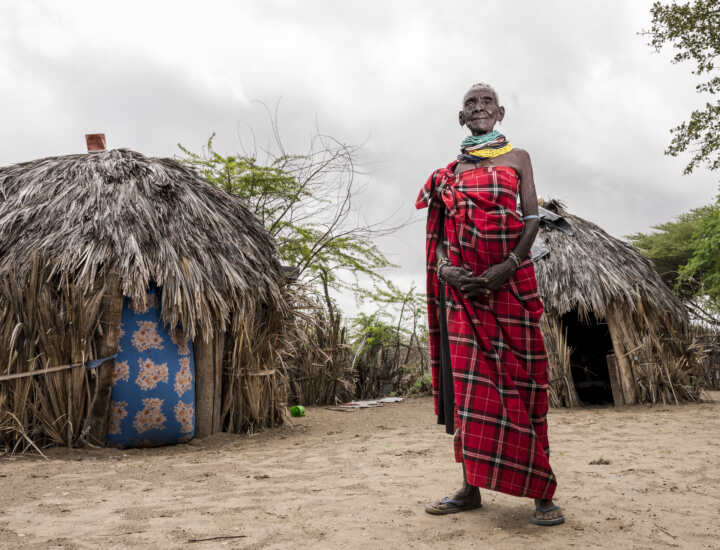
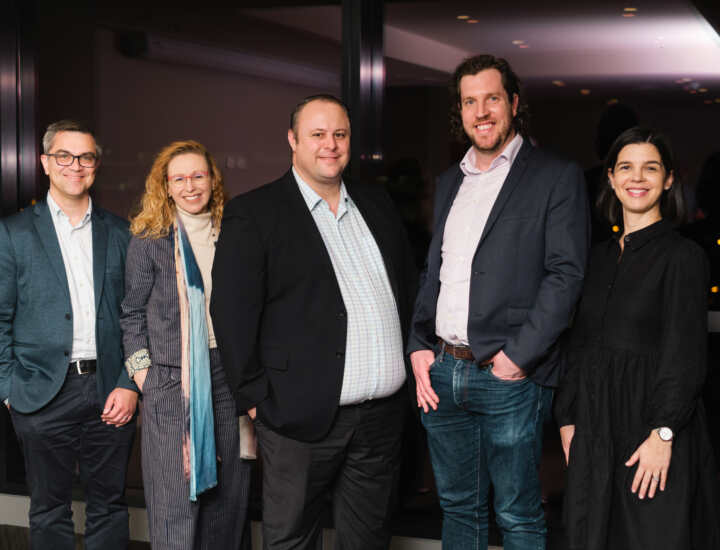
Our governance
Our board members are volunteers, acting in a non-executive capacity to provide strategic direction, oversight and thoughtful governance to CBM Australia.
The CBM Australia Board balances in-person Melbourne meetings with Zoom or hybrid meetings. With 5 of 8 Board members interstate, from South Australia, NSW and Queensland, we seek to enable a variety of interactions that are family-friendly and promote creative thinking. Multiple Board members have lived experience of disability.
The Board remains well supported by four Board Committees. The Board and its Committees together set and adaptively manage our Strategic Directions 2023-2026.
Our Board Development & HR Committee (BDHR) leads Board recruitment and skills mapping, review of regulatory requirements and good governance practice, and oversight of CBM Australia culture and ways of working. In May 2023, Nicole Dicker resigned from the Board, while David Toma and Alex Phillips were welcomed. Alex and David served as Board guests for a short period following a comprehensive recruitment process. They bring deep financial expertise alongside governance acumen.
Our Finance & Audit Committee (FAC) superintends healthy financial and risk management, including cyber security. In 2023, a refined Risk Management Framework was aligned to our Strategic Directions. While our new Melbourne office is being built and pending settlement, managing higher funds under investment is a core focus. Balance Sheet review continues to position CBM Australia for greater planned investment in impact alongside sustained lesser ‘office’ and administration costs.
Our Programs Committee sustained oversight of program strategy and impact for CBM Australia. The Committee monitors an expanding relationship with the Department of Foreign Affairs and Trade, now taking three strands across the Australian Government’s ANCP program (field work), its Disability Section (advisory work) and its Global Health Section (a regional health partnership coming in 2024).
Our Community Engagement & Fundraising Committee (CEF) watches data and learnings to consider how well our brand resonates and how more people might come to engage with the cause of fighting poverty and exclusion. CEF oversees compliance with the Australian Council for International Development (ACFID) Fundraising Charter.
CBM Australia is a full and strongly contributing member of the CBM Global Federation, alongside CBM Ireland, CBM Kenya, CBM New Zealand, CBM Switzerland, and CBM UK.
Our finances
The generosity of CBM Australia supporters throughout the continued global uncertainties of 2023 was incredible, with 2023 giving at $22.53M.
The 2023 financial position is a strong surplus largely due to substantial bequests received near year end and a significant unrealised positive market movement in CBMA’s investment portfolio. Future planned deficits that increase funding to program activities are intended to offset historical surpluses.
In 2023, for every dollar given to CBM Australia, 74 cents supported field programs and 21 cents generated funds to support future programs, leaving 5 cents to deliver accountability and administration. For every $1 of fundraising expense in 2023 we received $3.28 of income.
CBM Australia’s Inclusion Advisory Group (IAG) continued to grow in 2023 with a total income of $3.47M.
The Australian Government strengthened its partnership with CBMA through our IAG services, the Australian NGO Cooperation Program (ANCP) and now the Regional Health Partnership (RHP) to implement development and poverty-alleviation programs overseas.
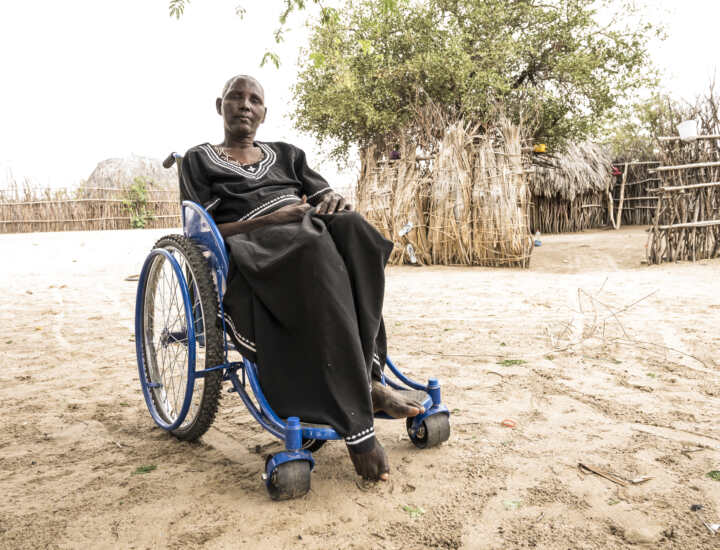
Directors’ Declaration
The directors of CBM Australia Ltd declare that the accompanying concise financial report is presented fairly in accordance with applicable Australian Accounting Standards and is consistent with the CBM Australia 31 December 2023 financial statements.
In respect to the 31 December 2023 financial statements of CBM Australia, the directors declare that the financial statements and associated notes comply with Accounting Standards and the requirements of the Australian Council for International Development Code of Conduct (ACFID).
The financial statements and notes give a true and fair view of the financial position as at 31 December 2023 and performance of the CBM Australia for the year then ended.
In the directors’ opinion, there are reasonable grounds to believe that CBM Australia will be able to pay its debts as and when they become due and payable. This statement has been made in accordance with a resolution of the Directors made on 23 March 2024

